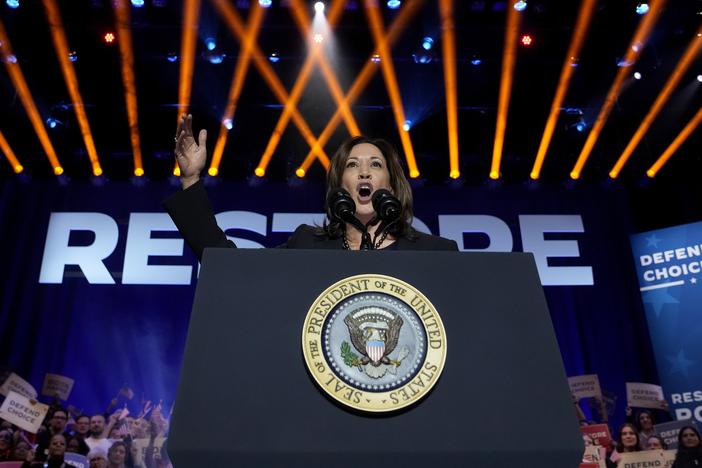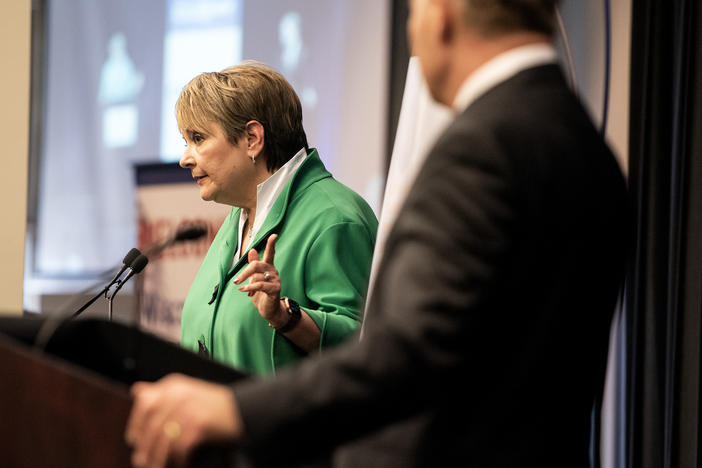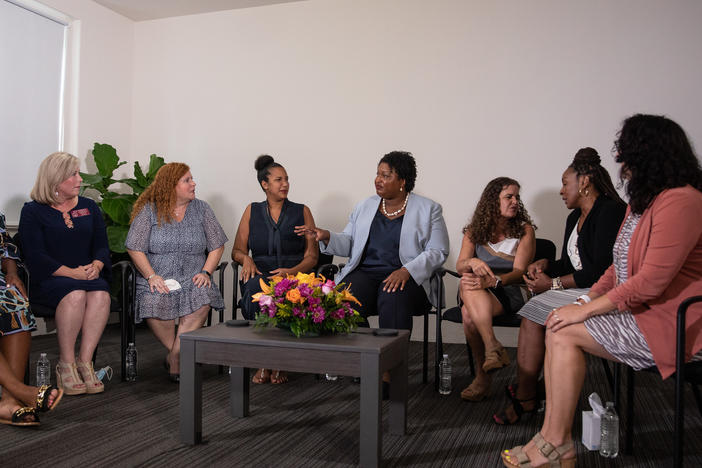Section Branding
Header Content
Stressed About The Elections? So Are Two-Thirds Of Americans
Primary Content
A new report by the American Psychological Association finds that nearly 7 out of 10 Americans are very stressed about the upcoming presidential elections. There are good ways to cope.
Transcript
LULU GARCIA-NAVARRO, HOST:
Have you read the latest poll, seen those endless lines to vote, woken up in the middle of the night, worried about what happens if your candidate doesn't win? Two-thirds of Americans are stressed about the upcoming elections, according to a recent survey. NPR's Rhitu Chatterjee talked to people about what they're feeling and how to cope.
RHITU CHATTERJEE, BYLINE: Shortly after the 2016 elections, Adrienne Deckman (ph) started having panic attacks.
ADRIENNE DECKMAN: I was, like, hyper vigilant and - you know, and with a rapid heartbeat and palpitations. And I couldn't sleep. And I was just, like, highly distracted all the time.
CHATTERJEE: Deckman is 67 years old, a lawyer and lives outside Cleveland, Ohio. She says the upcoming elections and the isolation from the pandemic have worsened her panic attacks. And she's exhausted by the political climate, which has affected people's interaction in her own community.
DECKMAN: I'm tired of people screaming at each other in parking lots and threatening each other and spitting on each other.
CHATTERJEE: Deckman's a Democrat. But Cassandra Dittman (ph), an independent voter in Mountlake Terrace, Wash., also shares those sentiments.
CASSANDRA DITTMAN: Seeing everyone just shut down and not listen to each other and not sit down and have conversations with each other, it's really disheartening and painful.
CHATTERJEE: In Fairfax, Va., a Republican, Jean Toussaint (ph), has similar feelings about the current political climate.
JEAN TOUSSAINT: I am concerned that the country needs healing because the climate is rather foul at times.
CHATTERJEE: Toussaint says he's hopeful about the elections. But he admits that, sometimes, he does get a little stressed.
TOUSSAINT: Every now and then, I get a little stomach tie-up.
GARCIA-NAVARRO: His main worry is what happens if Republicans don't win by a landslide.
TOUSSAINT: If we don't get a landslide, if this is contested, you know, I am concerned that we could have upheaval.
CHATTERJEE: Stress about the elections is a bipartisan problem, says Vaile Wright.
VAILE WRIGHT: It cuts across party lines where we see the majority of Democrats, Republicans and independents reporting high levels of stress related to the upcoming election.
CHATTERJEE: Wright is with the American Psychological Association and was involved with the survey.
WRIGHT: Seventy-seven percent of adults said that the future of our nation is a source of stress.
CHATTERJEE: The stress is unlikely to go down come election night, says psychologist Lynn Bufka, who's also with the American Psychological Association. Bufka says it's important to expect that there may not be a clear outcome right away.
LYNN BUFKA: If we're expecting a clear answer and we don't have it, that just extends the uncertainty for us.
CHATTERJEE: And uncertainty causes stress. She says it's also important to plan how to spend one's time waiting for those results. If you know watching TV, scanning the news is stressful, she says, don't do it. Instead, do something relaxing.
BUFKA: So find things that tend to keep you less distressed and less overwhelmed and make a plan to do those things.
CHATTERJEE: Like taking a walk with a friend or going on a bike ride or reading a book. Making a plan in times of uncertainty, she says, can give us a sense of control, which cuts down on stress. Then there are some simple healthy habits that can buffer against stress, says psychologist Vaile Wright.
WRIGHT: We need to be eating healthy. We need to really be getting the right amount of sleep. We need to be staying active. That can mean even just going for a walk.
CHATTERJEE: And disconnect from the news every now and then, she says. And rekindle your social connections. That's what Dylan Allen (ph) has found most helpful.
DYLAN ALLEN: I've kind of backed away from the news slowly but surely to kind of give myself some peace of mind and to kind of focus on what I can do to prepare myself for either outcome.
CHATTERJEE: He's reading books, listening to more music and investing in his personal relationships.
ALLEN: Talk to my family and friends, give them calls, check-ins, calling people for their birthday instead of giving texts - that's been really helpful for me to kind of manage that stress.
CHATTERJEE: The new survey also found that the majority of Americans remain hopeful about the future, despite all the stress. Rhitu Chatterjee, NPR News. Transcript provided by NPR, Copyright NPR.
Bottom Content



